Related Research Articles
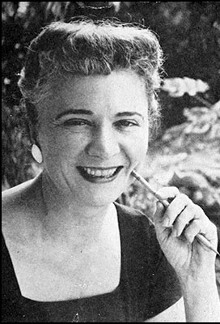
Catherine Lucille Moore was an American science fiction and fantasy writer, who first came to prominence in the 1930s writing as C. L. Moore. She was among the first women to write in the science fiction and fantasy genres. Moore's work paved the way for many other female speculative fiction writers.
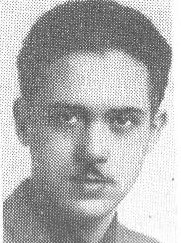
Henry Kuttner was an American author of science fiction, fantasy and horror.
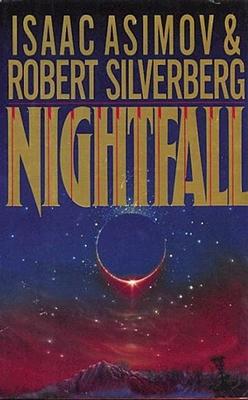
"Nightfall" is a 1941 science fiction short story by the American writer Isaac Asimov about the coming of darkness to the people of a planet ordinarily illuminated by sunlight at all times. It was adapted into a novel with Robert Silverberg in 1990. The short story has appeared in many anthologies and six collections of Asimov stories. In 1968, the Science Fiction Writers of America voted "Nightfall" the best science fiction short story written prior to the 1965 establishment of the Nebula Awards and included it in The Science Fiction Hall of Fame Volume One, 1929–1964.
Lewis Padgett was the joint pseudonym of the science fiction authors and spouses Henry Kuttner and C. L. Moore, taken from their mothers' maiden names. They also used the pseudonyms Lawrence O'Donnell and C. H. Liddell, as well as collaborating under their own names.

"Anniversary" is a science fiction short story by American writer Isaac Asimov. It was first published in the March 1959 issue of Amazing Stories and subsequently appeared in the collections Asimov's Mysteries (1968) and The Best of Isaac Asimov (1973).
The Golden Age of Science Fiction, often identified in the United States as the years 1938–1946, was a period in which a number of foundational works of science fiction literature appeared. In the history of science fiction, the Golden Age follows the "pulp era" of the 1920s and 1930s, and precedes New Wave science fiction of the 1960s and 1970s. The 1950s are, in this scheme, a transitional period. Robert Silverberg, who came of age in the 1950s, saw that decade as the true Golden Age.
Martin Harry Greenberg was an American academic and anthologist in many genres, including mysteries and horror, but especially in speculative fiction. In all, he compiled 1,298 anthologies and commissioned over 8,200 original short stories. He founded Tekno Books, a packager of more than 2000 published books. He was also a co-founder of the Sci-Fi Channel. Greenberg was also an expert in terrorism and the Middle East. He was a longtime friend, colleague and business partner of Isaac Asimov.
Marta Randall is an American science fiction writer.
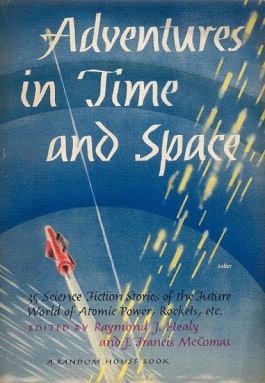
Adventures in Time and Space is an American anthology of science fiction stories edited by Raymond J. Healy and J. Francis McComas and published in 1946 by Random House. A second edition was also published in 1946 that eliminated the last five stories. A Modern Library edition was issued in 1957. When it was re-released in 1975 by Ballantine Books, Analog book reviewer Lester del Rey referred to it as a book he often gave to people in order to turn them onto the genre. It is now once again out of print.

Timescape, released on video as Grand Tour: Disaster in Time, is a 1992 American science fiction film directed by David Twohy and starring Jeff Daniels and Ariana Richards, with a cameo appearance by Robert Colbert, one of the co-stars of Irwin Allen's 1960s TV series The Time Tunnel. Twohy wrote the screenplay, which is loosely based on the 1946 novella "Vintage Season" by Henry Kuttner and C.L. Moore. It was released in 2023 on Blu-ray by Unearthed Films with the title The Grand Tour.

Isaac Asimov Presents The Great SF Stories 3 (1941) is an English language collection of science fiction short stories, edited by Isaac Asimov and Martin H. Greenberg. The series attempts to list the great science fiction stories from the Golden Age of Science Fiction. They date the Golden Age as beginning in 1939 and lasting until 1963. The book was later reprinted as the first half of Isaac Asimov Presents The Golden Years of Science Fiction, Second Series with the second half being Isaac Asimov Presents The Great SF Stories 4 (1942).
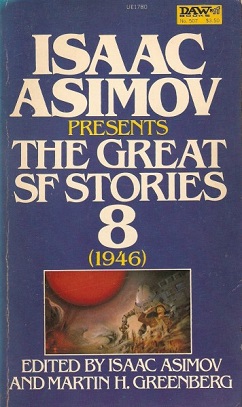
Isaac Asimov Presents The Great SF Stories 8 (1946) is an English language science fiction story collection, edited by Isaac Asimov and Martin H. Greenberg. It is part of a series which attempts to list the great science fiction stories from the Golden Age of Science Fiction. They date the Golden Age as beginning in 1939 and lasting until 1963. The book was later reprinted as the second half of Isaac Asimov Presents The Golden Years of Science Fiction, Fourth Series with the first half being Isaac Asimov Presents The Great SF Stories 7 (1945).
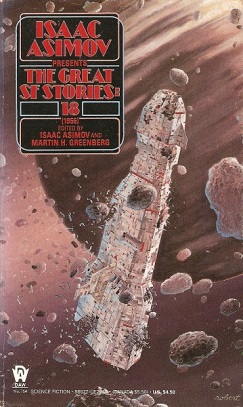
Isaac Asimov Presents The Great SF Stories 18 (1956) is the eighteenth volume of Isaac Asimov Presents The Great SF Stories, which is a series of short story collections, edited by Isaac Asimov and Martin H. Greenberg, which attempts to list the great science fiction stories from the Golden Age of Science Fiction. They date the Golden Age as beginning in 1939 and lasting until 1963. This volume was originally published by DAW books in August 1988.

Super-Science Fiction was an American digest science fiction magazine published from 1956 to 1959, edited by W. W. Scott and published by Feature Publications. Robert Silverberg and Harlan Ellison, who were at the start of their careers at the time, were already selling crime stories to Scott for his other magazines, Trapped and Guilty, and quickly started bringing Scott science fiction stories as well. Scott bought scores of stories from the pair during the magazine's short life; much of the remainder was sent in by literary agents, and generally comprised material rejected by other magazines first, though Scott did obtain two stories from Isaac Asimov.

The Time Traveler's Almanac is a 2013 anthology edited by Ann and Jeff VanderMeer. It contains stories that focus on time travel. It was released in November 2013 in the UK and on March 18, 2014, in the US.

Neanderthals is an anthology of science fiction short stories edited by Robert Silverberg, Martin H. Greenberg and Charles G. Waugh as the sixth volume in the Isaac Asimov's Wonderful Worlds of Science Fiction series. It was first published in paperback by Signet/New American Library in February 1987.
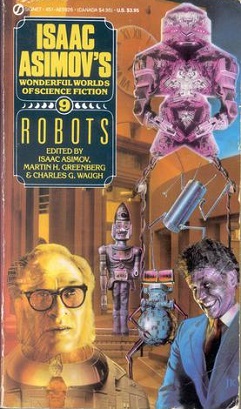
Robots is an anthology of science fiction short stories edited by Isaac Asimov, Martin H. Greenberg and Charles G. Waugh as the ninth volume in their Isaac Asimov's Wonderful Worlds of Science Fiction series. It was first published in paperback by Signet/New American Library in April 1989. The first British edition was issued in paperback by Robinson in 1989.
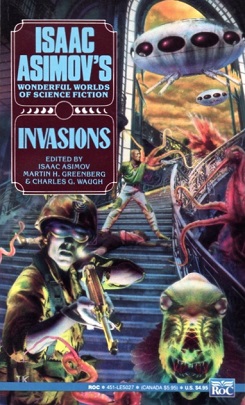
Invasions is an anthology of science fiction short stories edited by Isaac Asimov, Martin H. Greenberg and Charles G. Waugh as the tenth and last volume in their Isaac Asimov's Wonderful Worlds of Science Fiction series. It was first published in paperback by Roc/New American Library in August 1990, with the first British edition issued in paperback by Robinson at the same time.

Tales from the Spaceport Bar is an anthology of science fiction club tales edited by George H. Scithers and Darrell Schweitzer. It was first published in paperback by Avon Books in January 1987. The first British edition was issued in paperback by New English Library in 1988.

Robert Silverberg Presents the Great SF Stories: 1964 is an American anthology of short stories, edited by Robert Silverberg and Martin H. Greenberg, first published in hardcover by NESFA Press in December 2001. It is a continuation of the Isaac Asimov Presents The Great SF Stories series of short story anthologies, which attempts to list the great science fiction stories from the Golden Age of Science Fiction. This book is a continuation of the book series The Great SF Stories originally edited by Isaac Asimov and Martin H. Greenberg with the last one published in 1992.
References
- ↑ "Bibliography: Vintage Season". Internet Speculative Fiction Database. Retrieved 2010-01-12.
- 1 2 Asimov, Isaac (1984). Isaac Asimov Presents the Golden Years of Science Fiction: Fourth Series : 26 Stories and Novellas. Random House Value Publishing. p. 548.
- 1 2 3 Gunn, James (1984). "Henry Kuttner, C. L. Moore, Lewis Padgett, et al.". In Clareson, Thomas D (ed.). Voices for the Future: Essays on Major Science Fiction Writers. Bowling Green State University Popular Press. p. 206. ISBN 0-87972-120-0 . Retrieved 2010-01-13.
- 1 2 Knight, Damon (1956). "Genius to Order: Kuttner and Moore". In Search of Wonder: Essays on Modern Science Fiction. Advent. p. 98.
- 1 2 3 Magill, Frank N. (1979). Survey of Science Fiction Literature . Salem Press. p. 176. ISBN 0-89356-194-0.
- ↑ Hider is Chaucer's spelling of hither.
- 1 2 Moskowitz, Sam (1966). Seekers of Tomorrow. World Publishing Co. p. 316.
- ↑ Gunn, Voices, p. 208
- ↑ Stover, Leon E. (2002). Science Fiction from Wells to Heinlein. McFarland. p. 107. ISBN 0-7864-1219-4.
- ↑ Del Rey, Lester (1980). The World of Science Fiction, 1926-1976: The History of a Subculture. Garland. p. 110. ISBN 0-8240-1446-4.
- ↑ Pederson, Jay P. (1996). St. James Guide to Science Fiction Writers (Fourth ed.). St. James Press. p. 854. ISBN 1-55862-179-2.
- ↑ "Bibliography: In Another Country". Internet Science Fiction Database. Retrieved 2010-01-13.
- ↑ "Timescape (1992)". Internet Movie Database. Retrieved 2010-01-13.